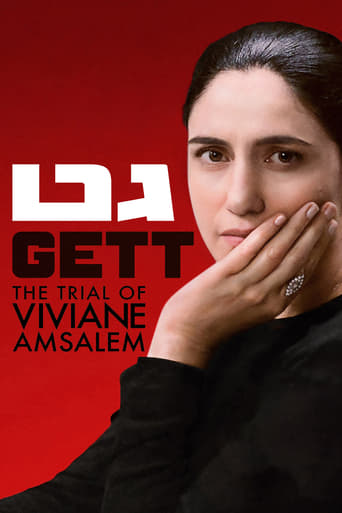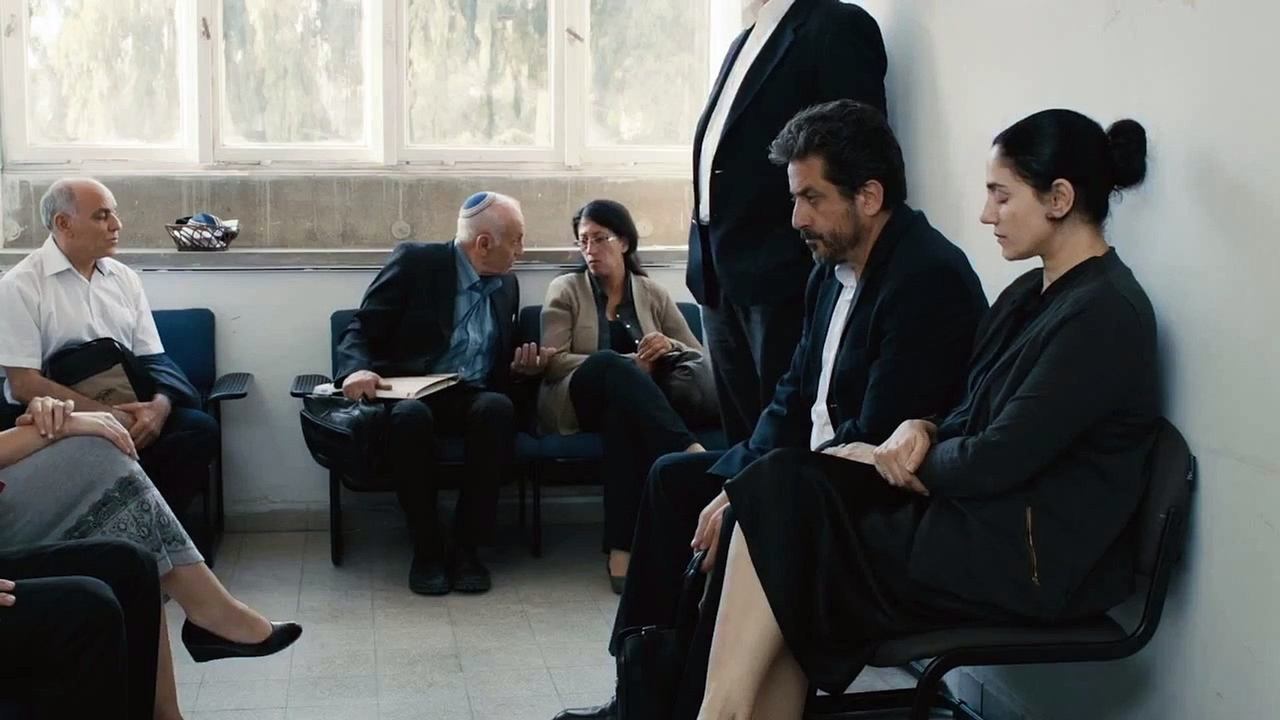ReganRebecca
Thanks to watching the Coen brothers' A Serious Man and Joan Micklin Silver's Hester Street I knew what a Gett was, but little else when I first watched the film.A religious Jewish divorce, a Gett is apparently the only type of divorce you can get in Israel. The film is about a Morrocan-Israeli couple, Viviane Amsalem and her pious husband, Elisha, who are getting a divorce. It quickly becomes clear that the divorce is not Elisha's idea and that he doesn't want to grant it. The rabbinical court tries to be fair, but the drama drags on for years as Elisha cannot bring himself to divorce his wife. The film is brilliantly shot almost entirely within one room (there are a few brief scenes that take place outside the courtroom in the waiting room of the building as Elisha and Viviane wait their turn. The camera work is still but it feels vibrantly dynamic and that's because the camera is always showing point of view of one of the characters so we are always in their skin. We only hear about Elisha and Viviane's marriage through how they represent it in court and through their neighbour's testimony but it's easy to see how dysfunctional and claustrophobic it feels and how awful it is to be held hostage to a system in which only the man can make the ultimate decision to sever the marriage. I didn't know this going into the film, but the movie is actually the last part of a trilogy, all starring Ronit Elkabetz and Simon Abkarian and all directed by Elkabetz and her brother Shlomi. This helps explain why the characters are so lived in (these people have been playing them for a decade), but even on its own, without knowing anything about the previous two films the film stands as a masterpiece in its own right, one of the best courtroom dramas I've ever seen which says so much despite being so pared down. It is the last ever film both as an actress and as a director for Ronit Elkabetz, who unfortunately died in 2016. But as an end note to her career she could hardly have done better. Gett is a masterpiece.
Argemaluco
The individuals and institutions promoting the rights of women make an admirable work, but sometimes, a film such as Gett is able to show us how much is still left to do in a much more devastating and memorable way, specially in regions of the world in which rules haven't changed enough throughout the centuries. And the fact that the film achieved that without any exaggeration or dull sermons reflects the brilliant work from co-directors and co- screenwriters Ronit (who was also the leading actress) and Shlomi Elkabetz. I also have to make the warning that Gett is a movie whose minimalistic structure and paused rhythm might end up boring some spectators (even though that wasn't my case). The film is exclusively developed inside the austere offices of a court in Israel, in which three wise rabbis judge and rule civil disputes. In this occasion, lawyer Carmel Ben Tovim requests the dissolution of the marriage between Viviane and Elisha, who has apparently been a model husband throughout the years. However, Viviane isn't entitled to separate due to the absence of concrete causes (such as abuse, adultery, etc.) and the husband is left the right to grant the divorce, even if his wife has been suffering an unhappy and incompatible marriage. In other words, Viviane is practically a slave without any rights or control over her destiny. And that's what the whole film basically consists on. The months of trial are extended to years while both sides of the conflict present witnesses, expose reasons and try to convince the judges. The process is obviously more difficult for Viviane, since her happiness and wish of marital freedom don't seem to be relevant factors in the legal process; law is always on her husband's side, while the judges don't even comprehend the woman's motivation. Even the witnesses appointed by her lawyer have difficulties to justify a divorce when none of the "normal" reasons are present. Why does Viviane not stay quiet and accept her devout wife role? And the most interesting thing is that none of that comes from intentional malice, but the combination of patriarchal culture with laws and traditions of a very slow evolution. The performances are excellent, since all the actors feel absolutely credible as authentic individuals with very particular interpretations about justice and spirituality. Apparently, Gett is the third part of a trilogy, but I don't think it's necessary to have watched the previous films in order to appreciate the remarkable attributes from this movie as well as its cultural and ideological value. In summary, I recommend Gett with enthusiasm because of its fascinating screenplay, perfect performances and austere direction which doesn't require the traditional ornaments of legal drama in order to captivate us and leave us thinking. Thinking specially about the blessing of being single.
Rodrigo Smithian
I learn some Jewish stuff, but why make a 2 hour film about a woman who wants to divorce his husband for shallow reasons? It was very desperate hear the whiteness's testimony telling the jury her husband Elisha is a perfect man, i wanted so badly to pop out a dirty secret about this man, and nothing happened. Viviane just wanted to be free despite she still love his husband. The reason: they just don't match. I felt really stupid waiting for some twist or surprises, and nothing happened. The entire movie is flat, too much talking, slow rhythm. Finally Vivian divorced him after 5 years struggling with the jury. Is like a bad Woody Allen tribute.Skip it. Im very disappointed.
Howard Schumann
Governed by strict religious rules, there are no civil courts for divorce proceedings for Jews in Israel. Even though women over age eighteen can vote and must, like everyone else, undergo compulsory military training, Israel is still a male-dominated society and wives are considered to be the property of the husband. This means that a divorce (referred to as a "get") can only be granted if the husband agrees to it, unless there is proof of physical abuse, infidelity, or lack of support. Without a divorce, a religious Jewish woman cannot remarry and becomes an ostracized member of the community called an "agunah" or a "chained person." This predicament of Jewish women in Israel is the focus of the absorbing Israeli film, Gett: The Trial of Viviane Amsalem. Directed by siblings Ronit and Shlomi Elkabetz, Gett, the third film in a trilogy that began in 2004 with To Take a Wife and continued in 2008 with 7 Days, is a powerful dramatization of Viviane Amsalem, an unhappily married woman (Ronit Elkabetz, Edut) who seeks a divorce from her husband Elisha (Simon Abkarian, Zero Dark Thirty). Since he refuses to grant her a get, she must plead her case in a religious court under the jurisdiction of three Orthodox rabbis.Winner of six Israeli Ophir Awards including Best Picture and nominated for a Golden Globe, Gett depicts the interviews and appointments Viviane has with the rabbinical court and the entire film takes place in the cramped courtroom or in the adjacent hallways. Viviane does not appear during the first few minutes as the camera focuses only on the men talking about her. She sits facing the judges and is only visible when she is being reprimanded for speaking without being spoken to. She needs no words, however, to convey the anguish clearly apparent on her face and in her gestures.Though the trial stretches out for what seems like an endless period of time, the directors stated that similar trials may take three times as long. The dramatization of the extended trial starts and stops as we are notified by intertitles such as "three months later," "two months later," "one year later," and so forth until five years have passed. There are times when Elisha does not show up in court in spite of the rabbi's order and who threatens to revoke his driver's license, cancel his credit cards, and/or send him to jail but to no avail. If a husband refuses to grant his wife a divorce, the rabbis are powerless to force him.Though Viviane has lived apart from him for four years and claims that they have not spoken during that time, the judges refuse to see that the marriage has gone past the point of no return and look for no solution other than having the couple remain together to try and "work it out." Witnesses are brought in to testify about Elisha being a good man (one calls him a saint) who even lets his wife go out alone. Even witnesses for the plaintiff say that Elisha has a good character. Represented by her articulate attorney Carmel Ben Tovim (Menashe Noy, Big Bad Wolves), Elisha is not accused of cheating, physical abuse, or lack of support, but only that, after thirty unhappy years of marriage, she no longer loves him and that they are incompatible.While Elisha sits in distant silence, one witness claims that she heard Viviane yelling and throwing things inside the house. At that point Viviane says "It's easy to blame the one who yells. Those who whisper venom are innocent." It often seems as if Viviane is on trial rather than the issue of divorce. Elisha's brother Rabbi Shimon (Sasson Gabai, The Band's Visit) who is representing him, calls her a "wayward" woman and the judge takes offense when she unties the bun and lets her hair fall on her shoulders while another judge chastises her for speaking her mind. Brazenly, Shimon accuses Carmel of being secretly in love with his client and one witness testifies that she saw Viviane in a café talking to a man who was not part of her family.As the trial drags on, it is clear that Elisha is simply not willing to let go and that he still loves his wife even if he defines it in his own terms. Gett has become a hot-button topic in Israel and is now being vigorously debated in both secular and religious circles. In fact, it mirrors a current case in New York where an orthodox rabbi has been accused of kidnapping husbands to coerce them through beatings and torture to provide a get to their wives. While there are no clear-cut victims and both characters are trapped in a heartbreaking situation, the film is a powerful indictment of archaic religious laws and traditions that make women second-class citizens. In the movie's most compelling moment, Viviane finally explodes in a torrent of rage and frustration, practically begging for her freedom. The rage and frustration is also ours.



 AD
AD



